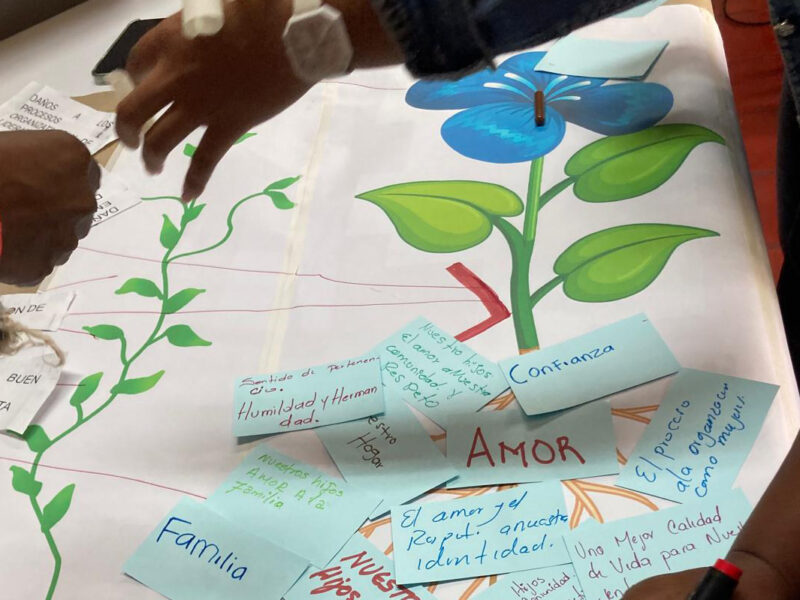Globala konflikttrender – vad säger forskningen om framtiden?
26 september, 2024FBA:s forskningsteam har analyserat trender som kommer att påverka globala konflikter och arbetet för fred under de kommande fem åren.
Today’s world is one of evolving conflicts and political unrest. In 2023, more conflicts were ongoing than at any time since the end of World War II. Global conflict dynamics have shifted due to new geopolitical tensions, technological advancements, hybrid threats and climate change. This has fundamentally reshaped the operational landscape for FBA and other actors working towards a more peaceful world.

Recently, FBA’s research team conducted a mapping of the trends that are likely to influence global conflict dynamics and peace efforts in the coming years. The analysis was based on scientific literature as well as on crucial input from FBA’s International Research Working Groups.
Here, I summarise the trends:
In many parts of the world today, we are witnessing democratic backsliding. The implications of this trend in terms of weakening of the rule of law and restrictions in political rights make societies more vulnerable to conflict. In addition, economic inequality and corruption erode trust between the population and formal institutions in many countries, potentially leading to unrest and political instability.
As a result of this growing autocratisation, it has also become harder for civil, peaceful protest movements to gain political momentum. This complicates efforts at inclusive peacebuilding.
In the coming years, climate change, environmental degradation, and competition over natural resources such as water, minerals, and land are also expected to exacerbate or cause conflicts. In turn, this may risk triggering migration flows that can fuel further conflict.
Extreme ideologies – right-wing extremism as well as religious extremism – are gaining ground across the world. These movements often mobilise legitimate grievances such as economic hardship for extremist purposes. In turn, extremist movements can also be used by state or non-state actors to further destabilise societies.
In many parts of the world, a pushback in terms of gender equality and LGBTQI+ rights is observed. We are also witnessing a global gender divide in terms of political views, and radicalised masculinities pose an increasing problem.
In terms of youth participation, it can be noted that the exclusion of many young people aged 18 to 29 from political participation further undermines prospects for a sustainably peaceful world.
In the coming years, we expect to see a further increase in geopolitical rivalries dominated by the US, EU, China, and Russia. As a result of this trend, nuclear war has once again become a threat to consider in global politics.
Most conflicts today involve states as one of the warring parties. The majority of battle-related deaths occur in such conflicts. The wars in Gaza and Ukraine are the most prominent examples of ongoing conflict where state actors are directly involved.
Beyond direct conflict, there are also a number of ongoing proxy wars where states use non-state armed groups to pursue their military or strategic interests, a trend that is expected to intensify in the coming years.
Additionally, private military companies such as the Russia’s Wagner group and US’ Academi are playing a growing role in conflicts across the globe, a development that poses new challenges in terms of accountability and human rights.
Multilateralism – international cooperation among states – faces major challenges today. We see repeated deadlocks in the UN Security Council and the UN has to date been unable to solve the conflicts in Ukraine and Gaza. The future of world order is expected to depend largely on the outcome of these wars.
International collaboration for peace and security is also compromised by the growing perception among many in the Global South that human life is not valued equally across the globe. This perception has led to increased tensions between the Global South and the Global North, a situation compounded by the relative neglect of certain conflicts, such as those in DR Congo and Sudan.
The number of peace agreements has declined over time. Due to international polarisation and involvement in intrastate conflicts in the form of support for warring parties, it has become increasingly difficult to manage such conflicts. This is because peace mediators must succeed at the local as well as at the international level to secure peace agreements that all parties can adhere to. In addition, terrorist designation of non-state armed groups complicates mediated settlements of conflicts involving such groups.
We are also seeing autocratic states increasingly taking up a mediator role. This development brings opportunities as well as risks. While it can be effective in the short term, it risks creating less inclusive and therefore less sustainable peace processes in the long run if peace agreements are anchored neither in the multilateral system nor in democratic values.
Technological advancement, particularly in the form of drones, are expected to continue having a significant impact on the conduct of war in the coming years. At the same time, paradoxically, the wars in Ukraine and Gaza show that despite technological advancements, the presence of humans on the battlefield remains crucial in order to win wars.
Societies are becoming increasingly digitalised worldwide, thus making them vulnerable to hybrid threats such as cyberattacks, disinformation, and attacks on civilian infrastructure. Hybrid attacks are already being carried out by both foreign powers and domestic political actors to destabilise democratic societies. For the future, it will be crucial to handle these threats and understand how artificial intelligence can be used for both destructive and constructive purposes.
In addition to the conflicts in Ukraine and Gaza, the world is witnessing several worrying trends at regional level. In Europe, there is a risk for increased tension on the Balkans. In the Middle East, the war in Gaza and the unfolding situation in Lebanon risks escalating further into a large-scale regional conflict.
On the African continent, there is a risk that further coups may create power vacuums in coming years that can be exploited by actors like China and Russia. In addition, several African countries are heavily impacted by climate change which, in combination with weak governance and uneven distribution of resources such as land, food, and water, risks contributing to continued instability.
Despite the bleak global outlook, there are opportunities for actors like FBA to contribute to sustainable peace. However dire the situation may seem, cross-border collaboration between a range of actors remains key to resolving future conflicts.
Through strategically planned international cooperation to promote global security, we can pave the way for a more peaceful and stable future. For instance, one possible contribution to sustainable peace and stability is to support inclusive and gender sensitive peacebuilding efforts where civil society actors actively participate.
Since FBA was founded in 2002, our mission has been to build peace. Now more than ever, this task requires that we are firmly anchored in knowledge. As part of FBA’s evidence-based approach, we draw on findings from scientific research, on proven experience of what works in peacebuilding, and on knowledge about the contexts where we work.
The present analysis of global conflict trends was carried out as part of FBA’s work with the Swedish government’s strategy for peace, security and stabilisation 2024–2028 which we are implementing together with Sida.
av Johanna Malm
Democratic practices have a long history in Iraq. But as a consequence of the more recent decades of authoritarian and centralized rule, the distinct responsibilities of citizens and the state in a democracy cannot be taken for granted.

Är det viktigare att veta sanningen om krigsbrott än att de skyldiga hamnar i fängelse? Världen drar lärdomar när Colombia banar nya vägar mot fred. År 2016 skrev FARC-gerillan och Colombias regering på ett fredsavtal som innehöll en väldigt nydanande metod för övergångsrättvisa. Avtalet etablerade nämligen en ny domstol som dömer de mest ansvariga för […]

Valet i Moldavien 2024 utgör ett tydligt exempel på hur hoten mot fria val blir alltmer komplexa. För att värna demokratin måste vi stärka ansvariga institutioner i att motverka hybrida hot. Demokratin befinner sig globalt på tillbakagång. Parallellt med att auktoritära styren stärker sitt grepp, utmanas fria och rättvisa val av en rad faktorer: ökande […]

Om FN inte fanns, skulle organisationen behöva uppfinnas. Den sanningen har upprepats ofta, och är väl värd att hålla fast vid i en tid då marken under FN-skrapan i New York gungar.